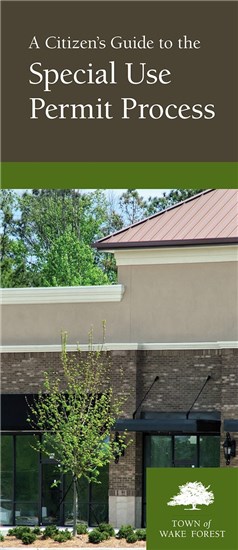Public Hearings Procedure
 Two types of zoning decisions require formal joint public hearings between the planning board and board of commissioners:
Two types of zoning decisions require formal joint public hearings between the planning board and board of commissioners:
Legislative zoning decisions affect the entire community by setting the policies and standards included in the Unified Development Ordinance (UDO). These include rezonings (map amendments) and text amendments
Quasi-judicial decisions involve the application of zoning policies already established in the Unified Development Ordinance to individual circumstances, including special-use permits, major subdivision plan approval and major site plan approval. These decisions involve the finding of facts regarding the specific proposal and the exercise of some discretion in applying predetermined policies to the situation.
Quasi-Judicial Hearings & Decisions
Standards for conduct of quasi-judicial hearings are established in Section 15.5.1 of the Wake Forest UDO.
The following information outlines the Town's procedure during quasi-judicial hearings.
The town attorney opens the public hearing with the following statement:
"Thank you, Mayor. This evidentiary hearing is a joint public hearing concerning Case __________. First, I need to confirm with the board members that no board member had any undisclosed ex parte communications since the last joint public hearing on this matter. [Wait for answer]
Thank you.
As a reminder to those in attendance, this is quasi-judicial, evidentiary hearing and, unlike a legislative hearing, it is not a forum for expressing opinions about the project. These Boards must make findings of fact enumerated in the Unified Development Ordinance and, by law, these findings must be based on competent, substantial and material evidence in the record. As a result, we again ask that you not offer unsupported opinions or speculation. Please limit your testimony to relevant and competent evidence.
To those citizens who wish to offer testimony tonight, we request that you be concise and that you limit your testimony to 3 minutes unless you are asked questions. Redundant or repeated testimony does not help your case and may be ruled out of order.
To make these proceedings operate as smoothly as possible, we will operate under the following procedures:
Anyone speaking at these proceedings, whether offering testimony or questioning a witness must be sworn. You must come to the podium, be sworn, and then identify yourself, state your address, and identify any group or organization you represent.
We'll begin with the staff report.
After the staff's testimony, the applicant may come forward to offer any additional evidence it wishes to present in favor of the Special Use Permit.
Next, the opponents, will have the opportunity to offer evidence in opposition, if they so choose. Are there any opponents present who wish to speak?"
The town attorney swears in each witness as follows:
"Please place your left hand on the Bible, raise your right hand and respond to the following: 'Do you solemnly swear that the evidence you are about to present is true to the best of your knowledge and belief?'"
"Please state your name, address and affiliation, if any, for the record."
Witnesses appear in the following order:
Planning Staff and Staff report. (Only questions from the Boards allowed)
Applicant's representative.
Applicant's experts or supporting witnesses.
Opponent(s)' representative or individuals.
Opponent(s)' experts or supporting witnesses.
The town attorney (chairman) asks if any other person has evidence to present
If so, a brief rebuttal and re-rebuttal is allowed
Introduction of written evidence
If there is no objection, the chairman (town attorney) states, "As there are no objections, this evidence is admitted."
It can then be passed around to all members if multiple copies aren't available.
If there is an objection, the witness should give a copy to the objector and the chairman should rule on the objection and the admissibility of the evidence.
Brief Recess
If a brief recess is required, the town attorney reminds the boards and the audience not to engage in ex parte communications*.
*Ex parte communications - Ex parte communications are communications made to influence a decision-making official off the record and out of the presence of other parties. Ex parte communications are restricted by State and local law. The restriction against an ex parte communication applies in local map amendments, sectional map amendments, abandonments, road closing, and similar proceedings where a decision must be made on a record. Any communication by telephone, email, letter, face-to-face conversation, or other off the record contact, is strictly prohibited. If a final decision by the board is based on or significantly influenced by matters outside the record, the action may be invalidated.
Conclusion
The town attorney asks the board of commissioners whether they would like to keep the hearing open until the next month in order to allow the boards to seek clarification and to give the parties a chance to respond.
In most cases, the meeting is "left open" so that during the next hearing, additional evidence can be introduced and testimony taken, but board members cannot have contact with applicants or opponents. Board members cannot talk to supporters, opponents, or witnesses in any substantive way. Violation will result in that member being disqualified from voting, may subject the town to a lawsuit, and possibly constitutes malfeasance in public office.
The meeting is then turned back over to the mayor.
The town attorney then reminds the board not to engage in exparte communications.
